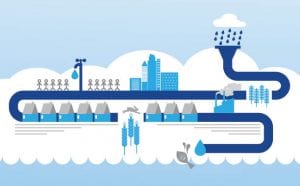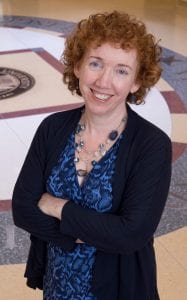 For most of Amber Long’s life, she has carried two passions: international travel and making a difference in the world. Both helped guide Long’s decision to major in Environmental Engineering and minor in Global Development at SMU Lyle.
For most of Amber Long’s life, she has carried two passions: international travel and making a difference in the world. Both helped guide Long’s decision to major in Environmental Engineering and minor in Global Development at SMU Lyle.
Long is pursuing a 4+1 degree in Environmental Engineering, focusing on water resources and international development. She’s also interested in a Master of Arts in Design and Innovation (MADI), undertaking double masters’ degrees because she “would really like to work on the design end of water purification systems in developing countries.”
Long, who speaks Spanish and French, has naturally embraced each study abroad program that aligns with her plans. Every summer or term break is scheduled with as much university and degree-program credit or real-world experience as her schedule permits. “Because of my passion for travel, I made it a priority to figure out the most efficient, yet creative, way to make the most of my SMU experience ‒ and still graduate on time,” Long says. “At SMU Lyle, I have a close-knit community of professors, advisors and deans supporting me as I make my plans a reality. Dr. Andrew Quicksall has been an endless source of wisdom for me, since he has had significant experience in the developing world, and will do everything in his power to help prepare me for the future.”
After her first year, Long attended SMU-in-Paris to work on her foreign language requirements. She is the vice president of projects for Engineers Without Borders (EWB) and traveled as a team member to Bolivia to work on a water well system. She has interned with EARTH University in Costa Rica, where she helped to design and build a hydroponics system, developed organic fertilizer and learned sustainable practices.
 This summer Long took a July term trip to Rwanda with Dr. Quicksall, associate professor at SMU Lyle, working as a team member in training for developing world water and energy practices. Her group saw community solar-powered wells, toured KivuWatt, a methane power plant on Lake Kivu, and helped collect water samples at Mahama Refugee Camp. “We evaluated the intricate design and development in the private, non-government sector, like WaterAid, as well as the government sector, by talking to the Ministers of Infrastructure and Education, even with Rwandan President Paul Kagame,” Long says. “These meetings helped shed light on how development standards differ outside the U.S. We used that knowledge in our field work to evaluate the new and existing projects we visited, helping to support the local Rwandans in bettering their communities by supplying water and basic sanitation services.”
This summer Long took a July term trip to Rwanda with Dr. Quicksall, associate professor at SMU Lyle, working as a team member in training for developing world water and energy practices. Her group saw community solar-powered wells, toured KivuWatt, a methane power plant on Lake Kivu, and helped collect water samples at Mahama Refugee Camp. “We evaluated the intricate design and development in the private, non-government sector, like WaterAid, as well as the government sector, by talking to the Ministers of Infrastructure and Education, even with Rwandan President Paul Kagame,” Long says. “These meetings helped shed light on how development standards differ outside the U.S. We used that knowledge in our field work to evaluate the new and existing projects we visited, helping to support the local Rwandans in bettering their communities by supplying water and basic sanitation services.”
At SMU, Long helps the Lyle Recruitment and Retention office conduct prospective student tours, as well as plan and attend early admission student receptions. As the social chair for Lyle Ambassadors, she coordinates outings and activities that help students relieve stress, one of which included building gingerbread houses before the holidays. “I enjoy the recruitment office because they’re a group that students can comfortably talk to about school, such as grades and where to get tutoring within Lyle,” Long says.
For three years Long has worked for Dr. Quicksall as a teaching assistant for the First Year Design course KNW2300, mentoring first-year students through the design, building and testing process for the year-end robot competition.
She credits her professional development to the Hart Center for Engineering Leadership, which has helped her with career building services such as resume review and the Engineering Connections Career Fair. “I took the Hart Leadership Assessment before I started my freshman year, and have used those results to work on areas in my education that will help make me a more well-rounded engineer,” Long says.
As a Huitt-Zollars Endowed Scholar at SMU, Long had the opportunity to personally greet and thank donor Bob Zollars, chairman of Huitt-Zollars, Inc. at the Lyle Scholarship Reception. “SMU makes it possible for students who get scholarships to actually meet their donors, and not just send them a thank-you note,” Long says.
“In the future, I hope to work for Culligan, a leader in worldwide water treatment, at one of its international offices to help bring clean water to as many people as possible,” Long says. With all her international hands-on experience, she certainly has quite the resume to make that happen.
Links:
Hart Center for Engineering Leadership, First Year Class: http://www.smu.edu/Lyle/Centers/HartCenter/OurApproach/Challenge/ClassEnrichment
Engineers Without Borders: https://www.smu.edu/Lyle/Institutes/HuntInstitute/Partners
B.S. in Environmental Engineering: https://www.smu.edu/Lyle/Departments/CEE/DegreePrograms
 Dr. Barbara Minsker, Civil and Environmental Engineering Chair, brings the perfect alignment of leadership, sustainability and Big Data expertise to change the landscape of Dallas
Dr. Barbara Minsker, Civil and Environmental Engineering Chair, brings the perfect alignment of leadership, sustainability and Big Data expertise to change the landscape of Dallas  Dr. Barbara Minsker, Chair, Civil and Environmental Engineering, Bobby B. Lyle Professor of Leadership and Global Entrepreneurship, and Senior Fellow, Hunt Institute for Engineering and Humanity
Dr. Barbara Minsker, Chair, Civil and Environmental Engineering, Bobby B. Lyle Professor of Leadership and Global Entrepreneurship, and Senior Fellow, Hunt Institute for Engineering and Humanity